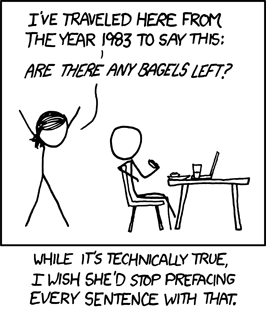Pauln6 said:
What happens when NuTrek's Kirk travels back when he reaches that crossroads in his timeline? Will TOS Kirk be waiting for him? How is that not a paradox?
I'm not entirely sure what you mean, but I don't really see a paradox there.
Pauln6 said:
Many worlds is too hard for the writers to grasp and they should always have left it alone.
What's hard to grasp about it?
As far as I can tell, the theory is something like this:
1. Time is linear. The past is in the past. This means that if, at some future point you travel back in time you are not 'changing the past' at the moment you decide to travel back because the past has already happened. If you go back then you would always have gone back. It is possible to be your own grandfather. It isn't possible to go back in time to kill your grandfather before you are conceived so that you can never be born. This is the concept of Times Arrow, Twelve Monkeys, and Babylon 5's War Without End (the heritage of Valen always existed).
2. In many worlds theory the concept of 'creating' an alternate timeline is a misconception. Every possible timeline already exists. When you throw time travel into the mix, this includes timelines where every potential time traveller travels to every conceivable point time. It also includes the concept of time travel bottlenecks where multiple time travellers end up at the same point in time in near infinite combinations. All the viewer is doing is jumping tracks to the 'alternate' timeline at the moment the time travel occurs. The time traveller is the one jumping tracks not the people in the timeline so the concept of time 'rippling' backwards and forwards is a misunderstanding. NuKirk WILL (probably) be the one who travels back in time in the future and his actions in his past may well be different to the TOS past. Therefore the NuUniverse WILL (probably) have a different past to the TOS universe.
3. None of this precludes the possibility that in this particular universe, a version of TOS Kirk jumps tracks and travels back into Nu Kirk's past instead. Red Dwarf does this a lot and it's precisely what they've done with Spock. It's possible but I just think it's very unlikely they'll do it again. Spock has simply jumped tracks.
4. It's impossible to 'restore' the timeline. The original timeline still exists and never changes. The characters we follow split off into their own timeline and are usually split off again to a similar but different timeline at the resolution of the story e.g. Yesterday's Enterprise; the whole series of Enterprise on multiple occasions. If they 'restore' the timeline (excluding predestination theory above), all the time travellers would be doing would be jumping back to their original timeline where their time travel never happened e.g. a timeline where Sela did not exist.
5. Since every conceivable timeline exists in every combination, the concept of Temporal Police to make sure no time travellers interfere is redundant.
The concept is portrayed as simple because otherwise it would confuse the masses and you seem to have bought into that notion. It is, however, ludicrously complex. Many worlds theory sucks.






